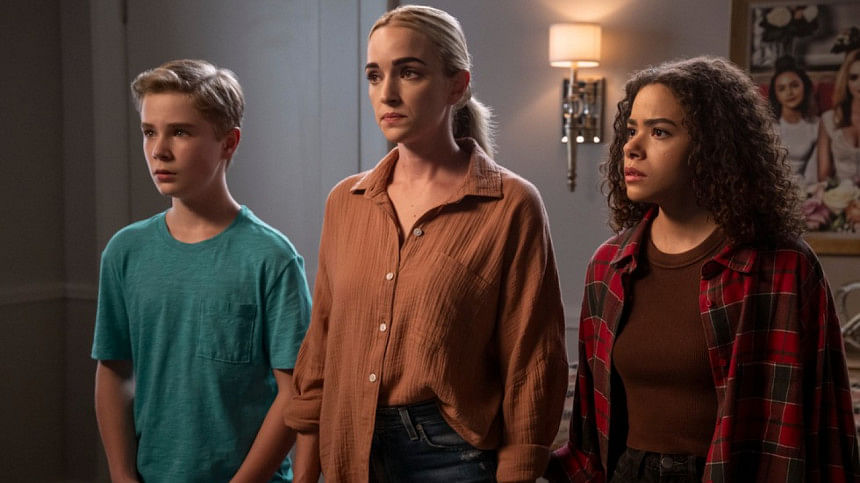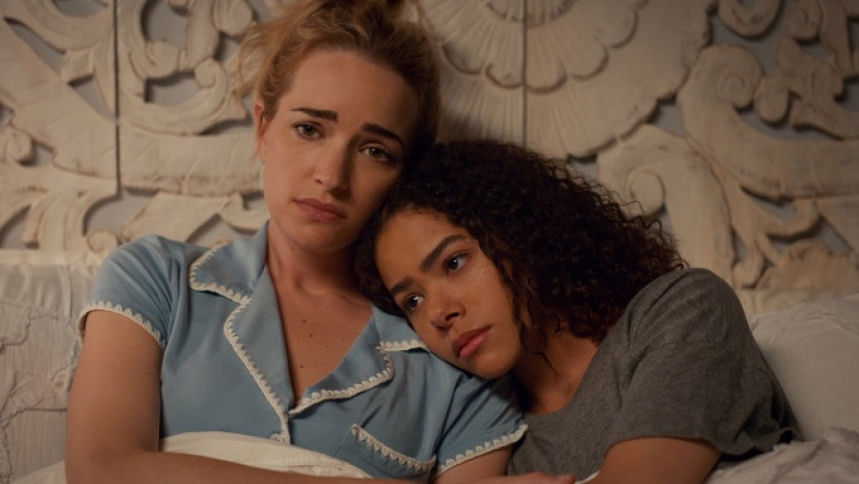The deliciously twisted return of ‘Ginny & Georgia’

There is a peculiar charm to watching someone murder with the same poise they might use to frost a cake. That's the Georgia Miller experience, which is equal parts molasses and menace. In its third season, Netflix's "Ginny & Georgia" leans all the way into that contradiction, offering up a deliciously disorienting blend of teen angst, courtroom spectacle, and suburban noir. With a new showrunner in place and a fresh appetite for audacity, the show does not just continue its chaos, it weaponises it.
Picking up right where Season 2 left off, on a wedding night gone criminal, Season 3 wastes no time unravelling the ribboned illusion of Georgia's perfect life. Arrested in her Cinderella-blue dress for the mercy killing of comatose Tom Fuller, Georgia is swiftly rechristened by the tabloids as "The Mayoress Murderess." It is a moniker that perfectly captures the show's penchant for over-the-top drama: dark, absurd, and accessorised to the nines. Georgia's newly minted marriage to Mayor Paul Randolph begins with house arrest and ankle monitors instead of honeymoon plans. And from there, things only get messier.

It is not just the law that is closing in on Georgia; it is the truth. Her daughter Ginny, played by Antonia Gentry with a mix of teenage exhaustion and quiet steel, is now fully aware of what her mother is capable of. So is her young son Austin, who witnessed Tom's death firsthand and carries that trauma like a ticking time bomb. Brianne Howey continues to deliver a masterclass as Georgia, walking the tightrope between Southern charm and psychological chaos. She is a mother, a liar, a killer, a survivor. One moment, she is sobbing in a bathtub; the next, she is bedazzling her ankle monitor like it is a PTA bake sale flyer. It is a performance soaked in contradictions, and Howey never flinches.
What was once just a running theme, Georgia doing bad things for good reasons, now becomes a shared burden. No longer the sole keeper of her crimes, Georgia drags her entire family into the wreckage, and with that, the show's longstanding "us against the world" mantra feels more literal than ever. Yet, the heart of Ginny & Georgia has never been its plot twists; rather, it's the toxic, magnetic bond between mother and daughter. That dynamic remains as complex and riveting as ever. Their love is a minefield, fragile, codependent, occasionally explosive.

Season 3 deepens these contradictions with well-placed flashbacks that explore Georgia's traumatic past, an upbringing filled with abuse, desperation, and yes, multiple murders. These glimpses into her backstory do not excuse her actions, but they make her harder to write off entirely. She is not just a murderer, rather a product of a world that never protected her, and now she is trying to do the safeguarding, no matter how twisted her methods become. Whether the audience sees her as a villain or a victim becomes less relevant than the show's insistence that she is both.
If Season 2 flirted with chaos, Season 3 marries it, possibly at gunpoint. The courtroom drama that unfolds in the back half of the season is as unsubtle as it is compelling. It adds real stakes, yes, but it also indulges in the soapier instincts of the show: secret testimonies, last-minute evidence, characters declaring love and doubt in the same breath. Scott Porter's Paul gets more to do this season, navigating the chasm between his roles as husband and public official. His muted scenes with Ginny's father, Zion, reveal a man trying, and often failing, to believe in the woman he married. It is one of the season's more grounded subplots, and it pays off in moments of genuine gravitas.

Meanwhile, the show continues to give its teen ensemble a much-needed dimension. New showrunner Sarah Glinski seems especially attuned to the younger cast, and it shows. Ginny's inner life, explored through therapy and poetry, becomes one of the season's most affecting threads. Gentry's performance balances teenage volatility with mature introspection, and her scenes with her therapist are some of the most emotionally honest moments the show has ever offered. Marcus, played with aching restraint by Felix Mallard, steals the season with his portrayal of depression. His storyline never veers into melodrama, even as it brushes up against it, and his chemistry with Gentry continues to smolder with believable weariness.
Sara Waisglass's Max remains a chaotic delight, her performative cheerfulness beginning to fray at the edges, suggesting deeper pain beneath the glitter. Katie Douglas, finally given more screen time as Abby, delivers a vulnerable portrayal of a teen battling body image struggles, low self-worth, and the aching desire to disappear. Even Diesel La Torraca's Austin, who in previous seasons felt more like a plot device than a person, gets a few scenes of chilling clarity. His silence speaks volumes, and sometimes, it screams.

For me, what makes "Ginny & Georgia" tick is not just its wild tonal swings but its audacity to pretend it all makes sense. One moment, a high schooler is spiraling into self-harm; the next, we are watching Georgia decorate cupcakes while plotting her next legal dodge. The show dares you to take it seriously, and then tells you not to. It is dizzying, occasionally exasperating, but never boring. It has no interest in subtlety and even less in neat resolutions. It is a rollercoaster operated by someone who may or may not be drunk, and somehow, that is part of the appeal. Still, not everything lands. Some of the late-season twists feel more convenient than earned, and the show's constant inclination to jump genres — from high school dramedy to legal thriller — can feel like emotional whiplash. Then again, even its missteps are bold.
The final moments of the season deliver a cliffhanger that is as cruel as it is irresistible. It is a narrative gut-punch that sets the stage for what could be an even darker, even more intimate Season 4. Despite all its plot acrobatics, "Ginny & Georgia" remains a survival story about mothers doing what they can with what they have got; about daughters learning where love ends and enabling begins; and about growing up, growing tired, and growing wise. It is messy, manipulative, and morally murky, and it knows it, making that self-awareness a saving grace. Ultimately, Season 3 does not just hold the audience's attention; it tightens its grip. The emotions are sharper, the performances more layered, and the stakes higher than ever. Whether you find it exhausting or exhilarating likely depends on your tolerance for high-gloss dysfunction. But one thing is for sure: this show understands its audience. And like Georgia herself, it might be a beautiful disaster, but it is a disaster definitely worth watching.

 For all latest news, follow The Daily Star's Google News channel.
For all latest news, follow The Daily Star's Google News channel. 




Comments